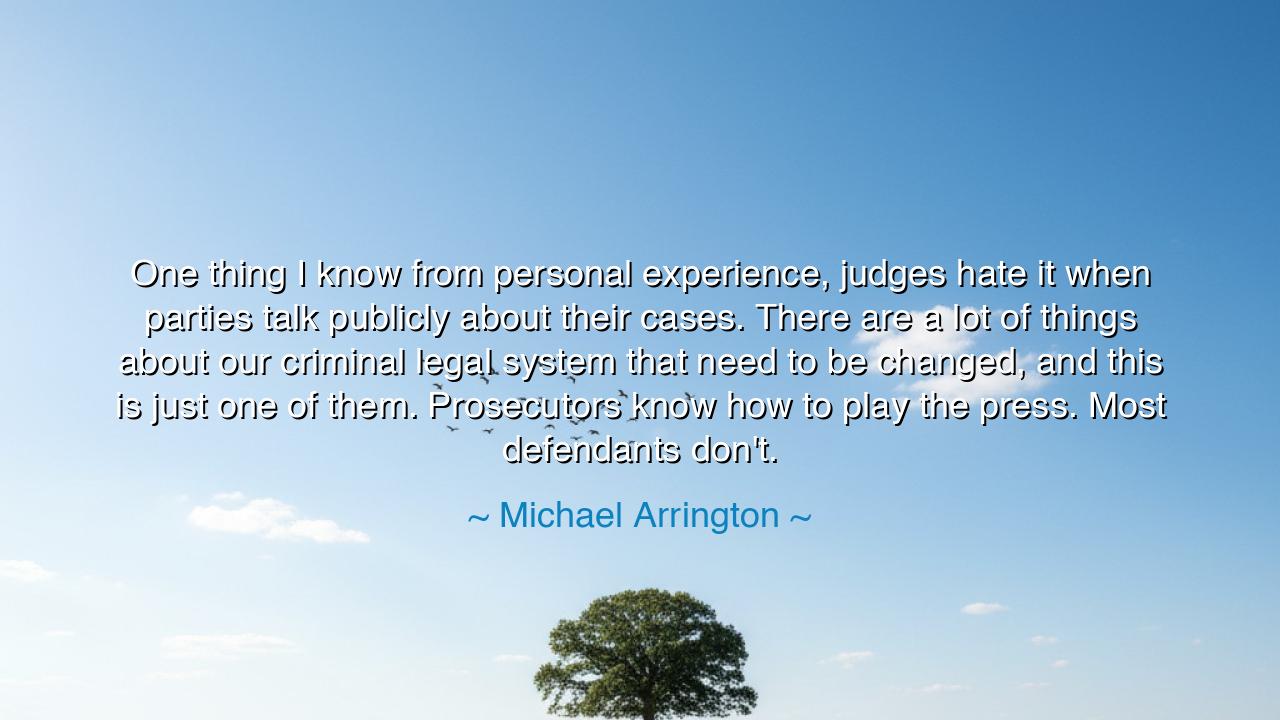
One thing I know from personal experience, judges hate it when
One thing I know from personal experience, judges hate it when parties talk publicly about their cases. There are a lot of things about our criminal legal system that need to be changed, and this is just one of them. Prosecutors know how to play the press. Most defendants don't.






Hearken, O seekers of truth and justice, to the words of Michael Arrington, who spoke from experience in the halls where power meets silence: “One thing I know from personal experience, judges hate it when parties talk publicly about their cases. There are a lot of things about our criminal legal system that need to be changed, and this is just one of them. Prosecutors know how to play the press. Most defendants don’t.” In these words lies a lament and a revelation—a glimpse into the imbalance between those who wield authority and those who must stand before it. It is a call to awareness, to courage, and to reform in the face of a system that often mistakes control for fairness.
Since the earliest ages of law, from the tribunals of Rome to the courts of our modern world, justice has walked hand in hand with perception. The ancients knew that words hold power, and that public opinion can sway the course of law as surely as evidence can. Arrington’s reflection reminds us that while the courtroom is meant to be a sanctuary of reason, it does not exist apart from human pride and prejudice. A judge, though charged with impartiality, may grow wary of those who speak beyond the courtroom’s walls. For to speak publicly is to challenge the sacred order of silence that the law demands—and that challenge is not easily forgiven.
Yet Arrington’s words are not merely about etiquette—they speak to inequality. He draws attention to the divide between the prosecutor and the defendant, between those who understand the machinery of the law and those crushed beneath its wheels. The prosecutor, trained in the art of persuasion, knows how to wield not only the letter of the law but also the power of the press—to shape stories, influence narratives, and prepare the ground upon which public opinion and justice are intertwined. The defendant, on the other hand, often stands bewildered, unable to speak, warned that any word may be used against him. Thus the balance of justice, already delicate, tips toward those who know the unspoken rules of the system.
Consider the tale of Socrates, brought before the Athenian court on charges of corrupting the youth and defying the gods. He, too, faced a tribunal shaped as much by perception as by truth. When he spoke in his own defense, he defied convention, refusing to flatter or manipulate. He chose truth over strategy, and though he lost his life, his words outlived his judges. Socrates teaches us that while silence may appease authority, speaking truth—even at personal cost—remains the highest act of courage. Arrington’s insight is born of the same realization: that systems designed to protect truth may themselves fear it when it comes from the lips of the accused.
The legal system, as Arrington observes, must evolve. It must learn to value transparency over secrecy, and equity over hierarchy. For when silence becomes the weapon of the powerful, justice is no longer blind—it is gagged. The rule that discourages open speech may once have served to preserve order, but in modern times it too often protects imbalance. Those who prosecute wield both law and language; those who defend must learn to navigate a world that punishes them for using either.
From this truth arises a lesson both moral and practical: that the pursuit of justice requires not only laws, but reform, empathy, and the courage to confront imbalance. The defendant’s voice must be heard—not to disrupt, but to humanize; not to manipulate, but to clarify. A society that fears open dialogue is one that risks confusing authority with truth. The ancient philosophers taught that wisdom thrives only in the light; so too must justice.
O seekers of understanding, take this teaching into your own hearts: when faced with silence imposed by power, speak wisely, but do not cease to speak. When you witness inequity disguised as order, call it by its name. Support reforms that open courts to accountability and give voice to the unheard. For justice, like the sun, must not be hidden behind clouds of fear or secrecy. And as Michael Arrington reminds us, until the powerless can speak as freely as the powerful, the legal system will remain not a sanctuary of truth, but a battlefield of perception.






AAdministratorAdministrator
Welcome, honored guests. Please leave a comment, we will respond soon